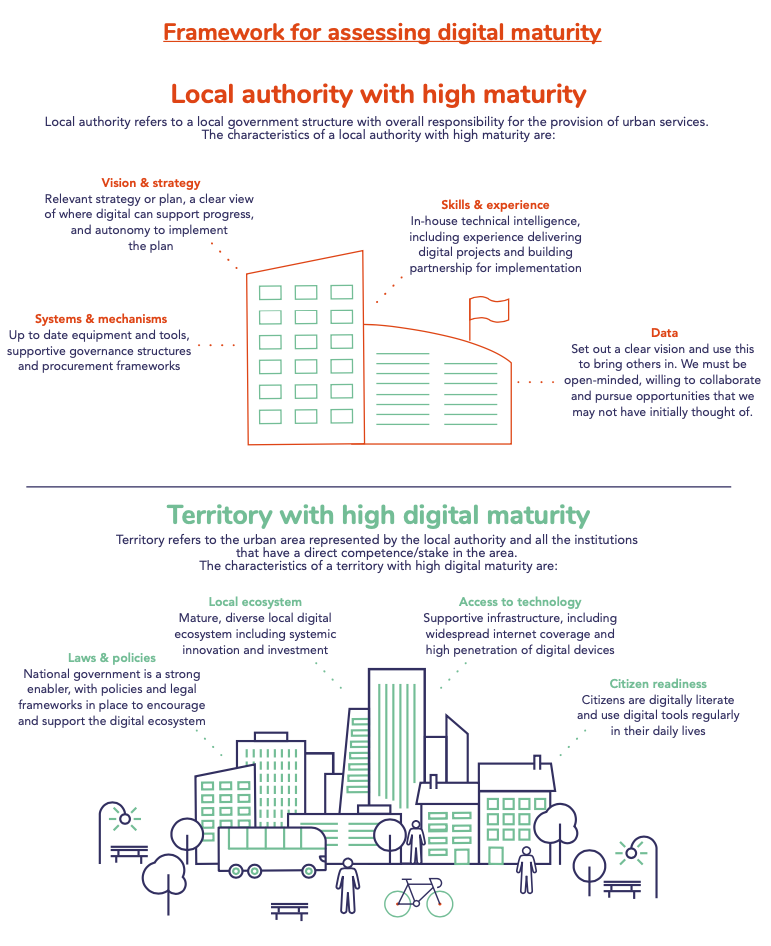Assessing digital maturity
Understanding the digital maturity of your area, and your local authority is essential to establish the starting point for any digital transformation project. We encourage local authorities to self-assess and identify strengths and weaknesses that may play a role.
Do you and your team have the capacity in-house to lead digital projects? How many citizens are digitally literate? How much of a digital divide exists, and what risk is there of excluding a significant proportion of the population by developing a new digital service? These are all questions you’ll need to address when embarking on a digital transformation project.
Digital maturity framework
Self-assess your local authority digital maturity to ensure you have fully understood the local context affecting your project.

HOW:
- Review the characteristics of digital maturity included in the framework
- Develop a list of questions you need to answer about your own city in order to assess it against these characteristics. We recommend including the following questions:
- Vision & strategy: Does your mayor strongly support digital transformation? Are there any digital plans / strategies already underway or about to begin in your city or country, and what do they aim to achieve?
- Systems & mechanisms + skills & experience: What relevant projects have been done to date, and were they successful? What challenges did they face? How would you rate the capacity of your local authority to conduct a digitisation project? What are some of the limitations within the local authority?
- Data: How is data collected and used by the local authority? Is data readily available on the urban services in your city? Is there a strong culture of data protection?
- Local ecosystem: Is there a thriving digital & tech ecosystem in the territory? Who are the key players and what size are the organisations? Are there any international players? How much investment is there into digital in general, and in gov-tech?
- Laws & policies: What is the role of the national government? What policies and legal frameworks are in place, and are they enabling or restrictive?
- Access to technology: What is the level of connectivity in the city/ country? How widespread is internet cover- age and what is the penetration of digital devices?
- Citizen readiness: What is the digital literacy of the population? Do citizens use digital tools already, such as mobile money? How comfortable are citizens using digital tools when engaging the government?
- Drawing on existing information and insights gained from interviews with key stakeholders, answer these questions carefully
- Then assess the maturity of your local authority and the territory by giving yourself a mark 1 (low maturity) – 5 (high maturity) against each characteristic
- It is important to avoid the temptation to give yourself a high mark on each characteristic, but instead see this as an opportunity to identify potential challenges you may face when embarking on a digital project. Also, consider the exercise as an assessment of where your city administration currently is, not where you would ideally like to be
- You might decide to design your project to fit into the context (e.g. ensuring a non-digital option is available to those who aren’t digitally literature), or you could include in your plans actions to increase the digital maturity (e.g. provide targeted digital literacy courses to key users of your service)
EXAMPLE:
As part of the ASToN network, the city of Nouakchott assessed the digital maturity of the local institutions as well as the citizens before embarking on their project. Despite estimated percentages of citizens with a mobile phone between 80 and 100%, and of citizens with a smartphone between 60 and 80%, they also estimated that less than 20% of the citizens have 4G mobile connections and a mobile money account. These estimations were later used to inform digital solution ideas. The team committed to ensure the solution is accessible to all citizens.


